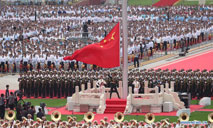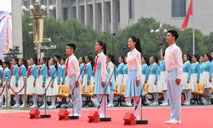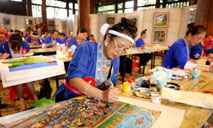Sinovac vaccine 'well tolerated, safe and induced humoral responses' in minors aged 3-17, to boost public confidence on herd immunity

A health worker prepares a dose of Sinovac vaccine at a vaccination site in Manila, the Philippines on March 31, 2021. (Xinhua/Rouelle Umali)
The world's first trial results on minors aged 3-17 showed China's inactivated COVID-19 vaccine produced by Sinovac had good safety, tolerability, and immunogenicity in youths aged 3-17 years, the Global Times learnt from Sinovac on Tuesday.
Observers believe the results will inspire the ongoing trial of other COVID-19 vaccines in children younger than 17years and boost public confidence to give shots to children younger than 17 years in the race to reach herd immunity. But the observers have also agreed caution should be taken to evaluate the long-term effects of the vaccine on children's development.
"CoronaVac is well tolerated in children and adolescents aged 3-17 years, and induces a strong immune response, which is very encouraging. We will further carry out large-scale, multi-ethnic population studies in order to provide valuable data for immunization strategies for children and adolescents," Gao Qiang, general manager of Sinovac, said.
The trial results were published on The Lancet Infectious Diseases on Tuesday, the world's first trial results on minors aged 3-17.
Results showed neutralizing antibody titres induced by the 3?0μg dose were higher than those of the 1?5μg dose. The results support the use of 3?0 μg dose with a two-immunization schedule for further studies in children and adolescents, according to the Lancet report.
China has authorized the emergency use of the COVID-19 vaccine manufactured by Chinese firm Sinovac for children aged between 3 and 17, Sinovac Chairman Yin Weidong told the media in early June. "But when the vaccine will be put into [emergency] use, and starting from what age in the group has yet to be decided," he said.
Zeng Yixin, deputy director of the National Health Commission, confirmed in an interview with Xinhua News Agency in early June that people aged between 3 and 17 will start receiving vaccines after approval. China's vaccination scheme will be promoted from the high-age group to the low-age group. China's vaccination drive has previously covered people aged 18 and above. The oldest people to be inoculated are over 100 years old.
The double-blind, randomized and controlled phase I and II clinical trials were conducted among healthy children and adolescents aged 3-17 years old at Hebei Provincial Center for Disease Control and Prevention in Zanhuang, North China's Hebei Province. Vaccine (in 0?5 mL aluminum hydroxide adjuvant) or aluminum hydroxide was only given in two doses on day 0 and day 28, according to the trial results.
In the combined safety profile of phase 1 and phase 2, adverse reactions within 28 days after injection occurred in 56 of the 219 participants in the 1?5?μg group, 63 of 217 in the 3?0?μg group, and 27of 114 in the alum-only group were respectively 26 percent, 29 percent and 24 percent.
Most adverse reactions were mild and moderate in severity. Injection site pain was the most frequently reported event, accounting for 13 percent of the total adverse reactions.
In the phase I clinical study, the positive conversion rate of neutralizing antibodies in children and adolescents reached 100 percent, 28 days after the vaccination of two doses of low-dose or medium-dose vaccine. While in the phase II clinical study, 28 days after the full course of immunization, the positive conversion rate of neutralizing antibody in the low and medium dose groups was 96.8 percent and 100 percent.
No neutralizing antibodies were detected in the placebo group, the report said.
The study also found that after two doses, the immune response in children and adolescents was better than in adults aged 18-59 and elderly people aged 60 and above. Age plays an important role in vaccine-induced antibody response, and immune response increases with age.
Photos
Related Stories
- Sinovac vaccine cuts COVID-19 deaths among Uruguayan adults by 95 pct: study
- Oldest vaccine recipients in China over 100 yrs old: official
- Chinese COVID-19 vaccines receive global recognition
- Philippines lauds WHO approval of China's Sinovac COVID-19 vaccine
- WHO's approval bolsters global confidence in Sinovac COVID-19 vaccine: Chilean minister
Copyright © 2021 People's Daily Online. All Rights Reserved.










